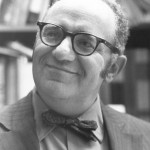The ‘Great Authors in 10 Quotes’ is an ongoing series meant to expose libertarian-leaning readership with some of the most noteworthy thinkers in the classical liberal, libertarian, and anarchist traditions. The challenge is finding material deep enough to reflect an author’s thought, while still being accessible for a brand new reader. We encourage readers to leave comments linking to other written works and videos by the author.
Murray Newton Rothbard (1926 -1995) was the single most influential figure of the post-WWII American libertarian movement. Rothbard synthesized concepts from Austrian economics, classical liberalism, individualist anarchism, and other sources to codify much of the thought underlying contemporary libertarianism. Rothbard was a student of Austrian School economist Ludwig von Mises and former associate of libertarian intellectuals such as Ayn Rand and Karl Hess. Rothbard published more than 20 works on libertarian topics ranging from economics, to history, to proposals for social activism.
1. I define anarchist society as one where there is no legal possibility for coercive aggression against the person or property of any individual. Anarchists oppose the State because it has its very being in such aggression, namely, the expropriation of private property through taxation, the coercive exclusion of other providers of defense service from its territory, and all of the other depredations and coercions that are built upon these twin foci of invasions of individual rights.(Society without a state, Libertarian Forum, 1975).
2. Rights may be universal, but their enforcement must be local.(Just War, 1994).
One common theme of the Old Right, New Left, and paleoconservatism is the emphasis on localism and political decentralization, in contrast to the nationwide centralization characterizing 20th century America. Rothbard’s support of localism was heavily influenced by the Catholic doctrine of “subsidiarity”.
3. It is no crime to be ignorant of economics, which is, after all, a specialized discipline and one that most people consider to be a ‘dismal science.’ But it is totally irresponsible to have a loud and vociferous opinion on economic subjects while remaining in this state of ignorance.(The Death Wish of the Anarcho-Communists, 1970).
4. If a man has the right to self-ownership, to the control of his life, then in the real world he must also have the right to sustain his life by grappling with and transforming resources; he must be able to own the ground and the resources on which he stands and which he must use. In short, to sustain his “human right.” (For A New Liberty: The Libertarian Manifesto, 1973).
Rothbard argues that all rights derive from property rights. The individuals’ ownership of their physical body is the moth basic of human rights.
5. There is one good thing about Marx: he was not a Keynesian.
Rothbard was one of the few Austrian School economists to work in post WWII American academia.
6. The libertarian creed, finally, offers the fulfillment of the best of the American past along with the promise of a far better future. Even more than conservatives… libertarians are squarely in the great classical liberal tradition that built the United States and bestowed on us the American heritage of individual liberty, a peaceful foreign policy, minimal government, and a free-market economy.(For a New Liberty).
Rothbard viewed libertarianism as a natural extension of American and Anglo-Saxon traditions.
7. It is clearly absurd to limit the term ‘education’ to a person’s formal schooling.(Education Free and Compulsory, 1999).
8. It is curious that people tend to regard government as a quasi-divine, selfless, Santa Claus organization. Government was constructed neither for ability nor for the exercise of loving care; government was built for the use of force and for necessarily demagogic appeals for votes. If individuals do not know their own interests in many cases, they are free to turn to private experts for guidance. It is absurd to say that they will be served better by a coercive, demagogic apparatus. (Power and Market: Government and the Economy, 1970).
9. In this century, the human race faces, once again, the virulent reign of the State—of the State now armed with the fruits of man’s creative powers, confiscated and perverted to its own aims. The last few centuries were times when men tried to place constitutional and other limits on the State, only to find that such limits, as with all other attempts, have failed. Of all the numerous forms that governments have taken over the centuries, of all the concepts and institutions that have been tried, none has succeeded in keeping the State in check. The problem of the State is evidently as far from solution as ever. Perhaps new paths of inquiry must be explored, if the successful, final solution of the State question is ever to be attained.(Anatomy of the State).
10. It is in war that the State really comes into its own: swelling in power, in number, in pride, in absolute dominion over the economy and the society. (War, Peace, and the State, 1960).
